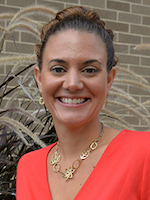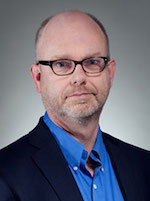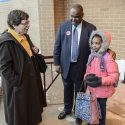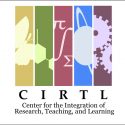UW-Madison language learning resource preparing to support bilingual preschoolers nationwide
Preschool teachers who work with bilingual or multilingual children in five states across the country, and as many as 13 additional states, soon will begin using new learning tools and receiving specialized training developed and provided by WIDA, an international nonprofit specializing in English and Spanish language development based at the University of Wisconsin–Madison.
In December, the U.S. Departments of Education and Health and Human Services awarded Preschool Development Grants totaling $226 million to develop or expand high-quality preschool programs. While these funds can be used by states to work with many partners, WIDA meets specific grant requirements by providing language standards, professional development services and assessment methods designed for young dual-language learners and their families.

Erin Arango-Escalante
WIDA, part of the Wisconsin Center for Education Research at the UW–Madison School of Education, is preparing to expand its Early Years program. This program was developed to support early care and education programs for children between the ages of 2 and 6 who are developing two or more languages. It emphasizes research-based best practices, including play-based learning, and focuses on family and cultural relationships.
“Positive relationships with primary caregivers and everyday child-initiated play supported by adults are critical to early learning and development,” says Erin Arango-Escalante, director of WIDA Early Years. “It is through these primary relationships and play that children learn to interact with others, develop language, acquire vocabulary, recognize and solve problems, and discover their potential.”
An estimated 11.2 million children in the United States ages 8 or younger are learning more than one language, which is a nationwide increase of 19 percent in the last 22 years. In some states, the number of bilingual children has increased by more than 200 percent. Most of these children speak Spanish and English.
“Early care and education programs are faced with the challenge of implementing culturally and linguistically relevant instruction and assessment,” says Arango-Escalante. “We can help state and local early care and education programs support dual-language development, while simultaneously providing practitioners and families with helpful tools and resources.”
In addition to the states currently working with WIDA — Massachusetts, Georgia, Nevada, Delaware and Wisconsin — other states have expressed interest in partnering with WIDA Early Years to provide administrators and educators with a comprehensive set of resources designed to promote the equity of young dual-language learners.

Tim Boals
The WIDA Early Years team is currently creating an early language development screener to provide educators and families a portrait of their child’s language. In 2015, the team will begin field testing a suite of language assessments in Nevada and other states. Coaching for program leaders and practitioners will launch in Massachusetts, while statewide training and technical assistance will begin in Georgia.
“We look forward to continuing to work with these states in developing their educational programs for young dual-language learners,” says WIDA Executive Director Tim Boals. “We hope more states will join this partnership to expand the educational opportunities available to children and their families across the country.”
WIDA also offers online tools and resources for educators who work with young dual-language learners.
—Janet Kelly
Subscribe to Wisconsin Ideas
Want more stories of the Wisconsin Idea in action? Sign-up for our monthly e-newsletter highlighting how Badgers are taking their education and research beyond the boundaries of the classroom to improve lives.



